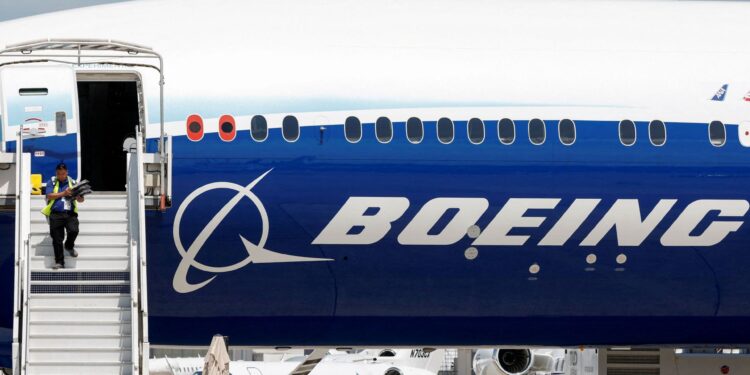In light of the escalation of the trade war between China and the United States, which was blew up by US President Donald Trump, the Chinese government decided to stop importing US Boeing aircraft, which sparked widespread concern in the global aviation sector, according to Bloomberg news agency from informed sources.
The agency reported that the Chinese authorities ordered their airlines not to receive any additional shipments from Boeing aircraft, and also asked them to stop buying equipment and spare parts from American companies.
A direct blow to Boeing and the American economy
Boeing is one of the pillars of the American economy, as it contributes about 79 billion dollars annually, and provides approximately 1.6 million jobs directly and indirectly.
The company is employing about 150,000 American employees, according to CNN.
Unlike other multinational companies, Boeing produces all its aircraft in the United States, and is exported about two thirds of its aircraft abroad, making it vulnerable to global trade fluctuations.
China, which is the largest global aircraft market, is a major partner for Boeing. The company appreciates that Chinese airlines will buy about 8,830 new aircraft during the next two decades, and that the Chinese Trading Fleet will double by 2043, driven by the high demand for air travel for passengers and goods.
According to the Boeing report, the China’s commercial aircraft fleet will grow at 4.1% annually, compared to a global rate of 4.7%. It is expected that the movement of passengers in China will increase by 5.9% annually, overcoming the global average.
Expectations of internal growth and market transformations
Boeing Marketing Management expectations indicate that the Chinese market will witness the largest internal air flow movement in the world, which leads to an increase in demand for a single corridor planes.
China is also expected to have the largest fleet of broad -body aircraft in the world, by 1.575 new aircraft, as well as doubling the fleet of charging aircraft approximately 3 times, driven by the prosperity of e -commerce.
Boeing expects that Chinese airlines will need 780 billion dollars to support the growing fleet, including maintenance, updates, and digital solutions. The sector will also require the employment and training of about 430,000 people in the fields of aviation, maintenance and air services.
The shares declined and possible delay
According to the British Guardian newspaper, Boeing’s shares have decreased by 7% since the beginning of the year, amid fears of the impact of customs duties. Its financial manager, Brian West, indicated that these measures may affect supply chains, and make it difficult to obtain the procedures from suppliers.
Investors also expressed their concern that the company does not invest enough in the field of engineering. After the Chinese decision, the shares decreased by an additional 3% due to the possibility of losing the Chinese market, which represents about 20% of the expected demand for Boeing aircraft in the next two decades.
Michael Olieri, CEO of Ryan Air, told the Financial Times that his company may postpone the receipt of 25 Boeing 737 Max aircraft if prices rise due to fees. He added that the company will not need planes before March or April 2026, preferring to wait until the image clarity.
Internal repercussions on the Chinese aviation sector
The repercussions of the decision are not limited to the American side only. The “Air Wiz Mag” magazine warned of the possibility of the Chinese Boeing Fleet, which includes more than 4,200 aircraft, if US spare parts continue to be cut off.
Among the most prominent challenges:
- The delivery of 179 Boeing aircraft was scheduled for 2027.
- Maintenance costs increased by 40-60% as a result of the 125% customs duties imposed by China on American goods.
- A temporary dependence on the stock of spare parts is sufficient only from 3 to 6 months.
Observers warn of a scenario similar to the aviation crisis in Russia in 2022, as the shortage of spare parts has disrupted 60% of Western aircraft in less than two years.
These tensions may also affect China’s plans to expand the production of its Civil plane “C919” through Kumak, which depends mainly on American engines and operating systems. China plans to produce 50 aircraft annually of this model by 2025.
Opportunities for competing countries and companies
Chinese restrictions open a wide door for regional and international competitors. According to the Times of India, Indian airlines such as “Air India Express” and “Akasa” can take advantage of the previously designated aircraft for China, especially the “737 Max” and “787 Dreamliner” models.
It is reported that India has had difficulty obtaining these aircraft previously, but redirecting them after the Chinese decision may contribute to reducing the crisis. It is worth noting that “Akasa” employs a number of pilots exceeding her need, which makes her ready to receive additional planes.
Airbus
The European company “Airbus” is probably the largest beneficiary of this shift. According to the China Daily, Airbus currently owns half of the Chinese market share, and has managed a collection factory in Tianjin since 2008, and until the end of 2024 it has handed over more than 800 aircraft to China, from the A320, A330 and A350 models.
George Show, the CEO of Airbus in China, confirmed that the Chinese market is the largest for the company globally, and that the aircraft directed to China represents about 20% of the company’s annual delivery.
Temporary gains and strategic losses
While the Chinese step is a direct political and economic response, it opens a door to double repercussions. Boeing may lose a huge share of the market, while China faces challenges in maintaining its fleet and its industrial aspirations.
With players such as India and Airbus benefit, the question remains open: Will the escalation reshape the civil aviation map? Or is the cost of commercial isolation to force the two parties to retreat soon?



